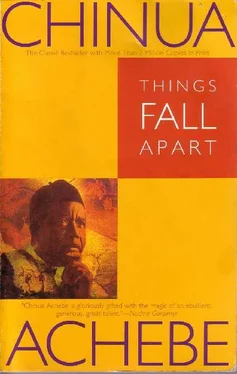Chinua Achebe - Things Fall Apart
Здесь есть возможность читать онлайн «Chinua Achebe - Things Fall Apart» весь текст электронной книги совершенно бесплатно (целиком полную версию без сокращений). В некоторых случаях можно слушать аудио, скачать через торрент в формате fb2 и присутствует краткое содержание. Город: New York, Год выпуска: 1994, Издательство: A DIVISION OF RANDOM HOUSE, INC., Жанр: Контркультура, на английском языке. Описание произведения, (предисловие) а так же отзывы посетителей доступны на портале библиотеки ЛибКат.
- Название:Things Fall Apart
- Автор:
- Издательство:A DIVISION OF RANDOM HOUSE, INC.
- Жанр:
- Год:1994
- Город:New York
- ISBN:нет данных
- Рейтинг книги:2 / 5. Голосов: 2
-
Избранное:Добавить в избранное
- Отзывы:
-
Ваша оценка:
- 40
- 1
- 2
- 3
- 4
- 5
Things Fall Apart: краткое содержание, описание и аннотация
Предлагаем к чтению аннотацию, описание, краткое содержание или предисловие (зависит от того, что написал сам автор книги «Things Fall Apart»). Если вы не нашли необходимую информацию о книге — напишите в комментариях, мы постараемся отыскать её.
—W. B. Yeats, "The Second Coming"
Things Fall Apart — читать онлайн бесплатно полную книгу (весь текст) целиком
Ниже представлен текст книги, разбитый по страницам. Система сохранения места последней прочитанной страницы, позволяет с удобством читать онлайн бесплатно книгу «Things Fall Apart», без необходимости каждый раз заново искать на чём Вы остановились. Поставьте закладку, и сможете в любой момент перейти на страницу, на которой закончили чтение.
Интервал:
Закладка:
Uchendu's eldest daughter, Njide, asked ll"
"Remember that if you do not answer lrulM"ь suffer or even die at childbirth," she began. "I l< have lain with you since my brother first cxpre1. to marry you?"
"None," she answered simply.
"Answer truthfully," urged the other women
"None?" asked Njide.
"None," she answered.
"Swear on this staff of my fathers," said U< In
"I swear," said the bride.
Uchendu took the hen from her, slil its ilin sharp knife and allowed some of the blood to I.ill MM tral staff.
From that day Amikwu took the young bridr and she became his wife. The daughters of the fain return to their homes immediately but spent two 01 with their kinsmen.
LL.
On the second day Uchendu called together his sons and daughters and his nephew, Okonkwo. The men brought their goatskin mats, with which they sat on the floor, and the women sat on a sisal mat spread on a raised bank of earth. Uchendu pulled gently at his gray beard and gnashed his teeth. Then he began to speak, quietly and deliberately, picking his words with great care:
"It is Okonkwo that 1 primarily wish to speak to," he began. "But I want all of you to note what 1 am going to say. I am an old man and you are all children. 1 know more about the world than any of you. If there is any one among you who thinks he knows more let him speak up." He paused, but no one spoke.
"Why is Okonkwo with us today? This is not his clan. We are only his mother's kinsmen. He does not belong here. I le is an exile, condemned for seven years to live in a strange land. And so he is bowed with grief. But there is just one 'luestion I would like to ask him. Can you tell me, Okonkwo, why it is that one of the commonest names we give our children is Nneka, or "Mother is Supreme?" We all know that a man is the head of the family and his wives do his bidding. A child belongs to its father and his family and not to its mother .ind her family. A man belongs to his fatherland and not to his motherland. And yet we say Nneka—'Mother is Supreme.' Why is that?"
There was silence. "1 want Okonkwo to answer me," said Uchendu.
"I do not know the answer," Okonkwo replied.
"You do not know the answer? So you see that you are a child. You have many wives and many children—more children than I have. You are a great man in your clan. But you are still a child, my child. Listen to me and I shall tell you. But there is one more question I shall ask you. Why is it that when a woman dies she is taken home to be buried with her own kinsmen? She is not buried with her husband's kinsmen. Why is that? Your mother was brought home to me and buried with my people. Why was that?"
Okonkwo shook his head.
"He does not know that either," said Uchendu, "and yet he is full of sorrow because he has come to live in his motherland for a few years." He laughed a mirthless laughter, and turned to his sons and daughters. "What about you? Can you answer my question?"
They all shook their heads.
"Then listen to me," he said and cleared his throat. "It's true that a child belongs to its father. But when a father beats his child, it seeks sympathy in its mother's hut. A man belongs to his fatherland when things are good and life is sweet. But when there is sorrow and bitterness he finds refuge in his motherland. Your mother is there to protect you. She is buried there. And that is why we say that mother is supreme. Is ь right that you, Okonkwo, should bring to your mother ,i heavy face and refuse to be comforted? Be careful or you may displease the dead. Your duty is to comfort your wives and children and take them back to your fatherland after seven years. But if you allow sorrow to weigh you down and kill you they will all die in exile." He paused for a long while. "These are now your kinsmen." He waved at his sons and daughter-.
"You think you are the greatest sufferer in the world? Do you know that men are sometimes banished for life? Do you know that men sometimes lose all their yams and even their children? I had six wives once. I have none now except that young girl who knows not her right from her left. Do you know how many children I have buried—children I begot in my youth and strength? Twenty-two. I did not hang myself, and I am still alive. If you think you are the greatest sufferer in the world ask my daughter, Akueni, how many twins she has borne and thrown away. Have you not heard the song they sing when a woman dies?
"' For whom is it well, for whom is it well? There is no one for whom it is well .'
j "1 have no more to say to you."
CHAPTER FIFTEEN
& $ It was in the second year of Okonkwo's exile
& that his friend, Obierika, came to visit him.
He brought with him two young men, each of them carrying a heavy bag on his head. Okonkwo helped them put down their loads. It was clear that the bags were full of cowries.
Okonkwo was very happy to receive his friend. His wives and children were very happy too, and so were his cousins and their wives when he sent for them and told them who his guest was.
"You must take him to salute our father," said one of the cousins.
"Yes," replied Okonkwo. "We are going directly." But before they went he whispered something to his first wife. She nodded, and soon the children were chasing one of their cocks.
Uchendu had been told by one of his grandchildren that three strangers had come to Okonkwo's house. He was therefore waiting to receive them. He held out his hands to them when they came into his obi , and after they had shaken hands he asked Okonkwo who they were.
"This is Obierika, my great friend. I have already spoken to you about him."
"Yes," said the old man, turning to Obierika. "My son has told me about you, and I am happy you have come to see us. I knew your father, Iweka. He was a great man. He had many friends here and came to see them quite often. Those were good days when a man had friends in distant clans. Your generation does not know that. You stay at home, afraid of your next-door neighbor. Even a man's motherland is strange to him nowadays." He looked at Okonkwo. "I am an old man and I like to talk. That is all I am good for now." He got up painfully, went into an inner room and came back with a kola nut.
"Who are the young men with you?" he asked as he sat down again on his goatskin. Okonkwo told him.
"Ah," he said. "Welcome, my sons." He presented the kola nut to them, and when they had seen it and thanked him, he broke it and they ate.
"Go into that room," he said to Okonkwo, pointing with his finger. "You will find a pot of wine there."
Okonkwo brought the wine and they began to drink. It was a day old, and very strong.
"Yes," said Uchendu after a long silence. "People traveled more in those days. There is not a single clan in these parts that I do not know very well. Aninta, Umuazu, Ikeocha, Elumelu, Abame—I know them all."
"Have you heard," asked Obierika, "that Abame is no more?"
"How is that?" asked Uchendu and Okonkwo together.
"Abame has been wiped out," said Obierika. "It is a strange and terrible story. If I had not seen the few survivors with my own eyes and heard their story with my own ears, I would not have believed. Was it not on an Eke day that they fled into Umuofia?" he asked his two companions, and they nodded their heads.
"Three moons ago," said Obierika, "on an Eke market day a little band of fugitives came into our town. Most of them were sons of our land whose mothers had been buried with us. But there were some too who came because they had friends in our town, and others who could think of nowhere else open to escape. And so they fled into Umuofia with a woeful story." He drank his palm-wine, and Okonkwo filled his horn again. He continued:
Читать дальшеИнтервал:
Закладка:
Похожие книги на «Things Fall Apart»
Представляем Вашему вниманию похожие книги на «Things Fall Apart» списком для выбора. Мы отобрали схожую по названию и смыслу литературу в надежде предоставить читателям больше вариантов отыскать новые, интересные, ещё непрочитанные произведения.
Обсуждение, отзывы о книге «Things Fall Apart» и просто собственные мнения читателей. Оставьте ваши комментарии, напишите, что Вы думаете о произведении, его смысле или главных героях. Укажите что конкретно понравилось, а что нет, и почему Вы так считаете.












